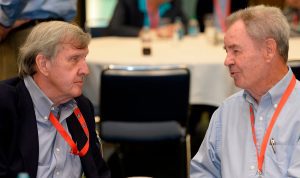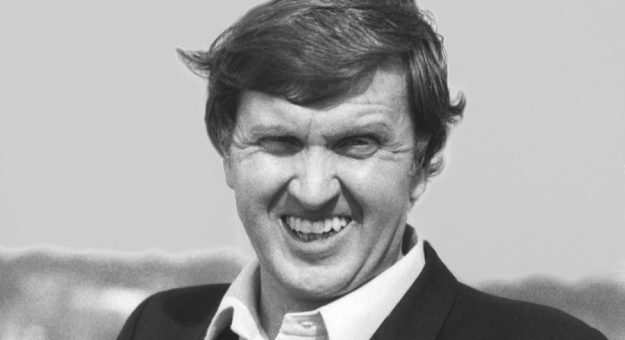Editor’s Note: This feature on legendary broadcaster and track promoter Ken Squier, who died on Wednesday, was originally published in the January, 2016, issue of SPEED SPORT Magazine.
There are a handful of motorsports legends who achieved iconic status without risking their lives at every turn. Broadcaster Ken Squier is among that select group.
Born April 10, 1935, Squier’s family owned and operated radio station WDEV in Waterbury, Vt., and his father, Lloyd, was a noted announcer.
“My dad used to work the fairs with the harness racing and the bigger fairs would have sprint car racing on the weekends,” Squier told SPEED SPORT about his introduction to auto racing. “That was pretty exciting stuff for a kid — and I never grew up.
“I would hang around those judges’ stands for the harness racing, so it sort of fell into place that when the Saturday show or the Sunday show came along that I would be around. I got to listen to some very good announcers at a very young age. Later I got to listen to Chris Economaki because he did most of the shows for promoter Sam Nunis at the eastern fairs.”
Squier eventually tried his hand behind the wheel.
“I raced some stock cars, up home here. There were all kinds of tracks in Vermont, so it was pretty easy to get something built up and go play. And I loved it,” he recalled. “Like everybody else, I wanted to go to Indianapolis. But I discovered by the time I was out of high school that my driving talents weren’t as significant as I might have thought and I found an alternative.”
That alternative was working auto races as a public address announcer.
“There were a lot of different tracks around that I worked and I went off to the university down in Boston and I worked the tracks down there,” Squier explained. “I ended up doing a lot of the announcing for the Northeast Midget Ass’n, which was sort of a derivative of the American Race Drivers Club, the ARDC.”
One of the racers Squier got to know while calling the midget events was Bob Sall and Squier says Sall was instrumental in telling stock car promoter Bill France about his talents behind the microphone. Bill France Jr. eventually hired Squier and one of his tasks was to assemble a radio network to broadcast many of the NASCAR races.
“He hired Roger Baer from Iowa and myself to kind of head that up, clear stations and assemble what became and what is now the Motor Racing Network,” said Squier, who served as the radio network’s lead announcer for several years after it debuted at the 1970 Daytona 500.
As sports television looked to expand during the 1970s, the networks became interested in auto racing and they needed announcers that were familiar with the sport.
“ABC was trying to get into doing more motorsports and doing it more than the last 15 or 20 minutes with a highlights package from the earlier parts of the race. For one of those races, they hired me to go with Chris Economaki and Jim McKay, it was at Greenville-Pickens Speedway and Bobby Isaac won it,” Squier said about his television debut, which came during the first live, flag-to-flag coverage of a NASCAR race on April 10, 1971. “I was the pit announcer for that one.”

As a result of his work on a handful of races that aired on ABC, Squier eventually became a reporter/producer for “Chevrolet presents Sports Illustrated,” a program hosted by Jack Whitaker that aired on CBS.
“Up until then, CBS was the Tiffany network and they wouldn’t do racing, they wouldn’t do boxing, there were a bunch of things they didn’t feel were appropriate for television. That changed and they wanted to branch out,” Squier recalled.
“The first thing we did was some Indy car racing — Trenton, Milwaukee, Phoenix, I think we also did Texas World Speedway, and there were a couple of others in there as well. They were looking for other events and they were looking for a new audience.
“I was around NASCAR racing a lot during that time, and meanwhile I was up at CBS. I was doing everything from the Calaverous County Frog Jumping Contest to the Great Hollering Contest in Spivey’s Corner, N.C. The sort of things Charles Kuralt was doing on the news, I was doing as part of the ‘CBS Sports Spectacular.’
“But they knew of my racing background, so they began to ask me more and more questions. At this time, ABC had been doing the Daytona 500 on a delayed basis and the idea of doing it flag to flag was one I brought forward that would be unique and that would capture people’s imaginations.”
And did it ever as CBS’ live, flag-to-flag coverage of the 1979 Daytona 500, with Squier as the lead announcer, is recognized as the launching point for the sport’s monumental growth over the next two decades.
Squier continued to anchor CBS’ NASCAR coverage, including the Daytona 500, until 1997 and he served as the program’s host until 2000.
Squier also pioneered the motorsports news program when he and partner Fred Rheinstein introduced ‘MotorWeek Illustrated’ through their World Sports Enterprises production company. Interestingly, the concept for the program was originally developed for CBS but by that time management changes had taken the network in a different direction.
“We went to CBS with it and thought we would own the world, and they said, ‘No, thank you,’ Squier shared. “It laid around for a year or two and Robert Wussler (who was previously the president of CBS Sports) ended up running Ted Turner’s news department. Wussler remembered something about this and in a conversation somewhere along the line it came back up.
“Robert said, ‘I know where I can program that.’ At that point, Turner had a wrestling program on Saturday afternoons and it was done in their Atlanta studios. In trying to reach a greater audience, Turner wanted programming that would reach out to new audiences and really had a category for sales.
“Here was motorsports and here was this program that took them into these categories — the tires, the oils and the automotive aftermarket stuff. So he put the half-hour program on before wrestling and he was right. They sold that out in no time at all.
“Dave Despain was the host. I think we were there eight or nine years and we ended up with a couple of other shows over there as well. We also did a show called ‘Winners’ and by then we were doing Turner’s racing coverage.”
Squier and Rheinstein sold their production company to The Nashville Network in 1995.
Today, at age 80, Squier still owns and operates Radio Vermont, which includes WDEV AM and FM; he owns Thunder Road Speedway in Barre, Vt.; continues to do PA work at select NASCAR tracks; and occasionally does voice-overs for television.
Isn’t it about time to ease off the throttle?
“I’m afraid if I slow down, I’d fall off. I’d just as soon keep going,” Squier responded. “I’m trying to back off. I probably need to find an owner for Thunder Road, but I love that. We built that track in 1960. It was my idea of what a high-banked, quarter-mile asphalt oval should be.”
